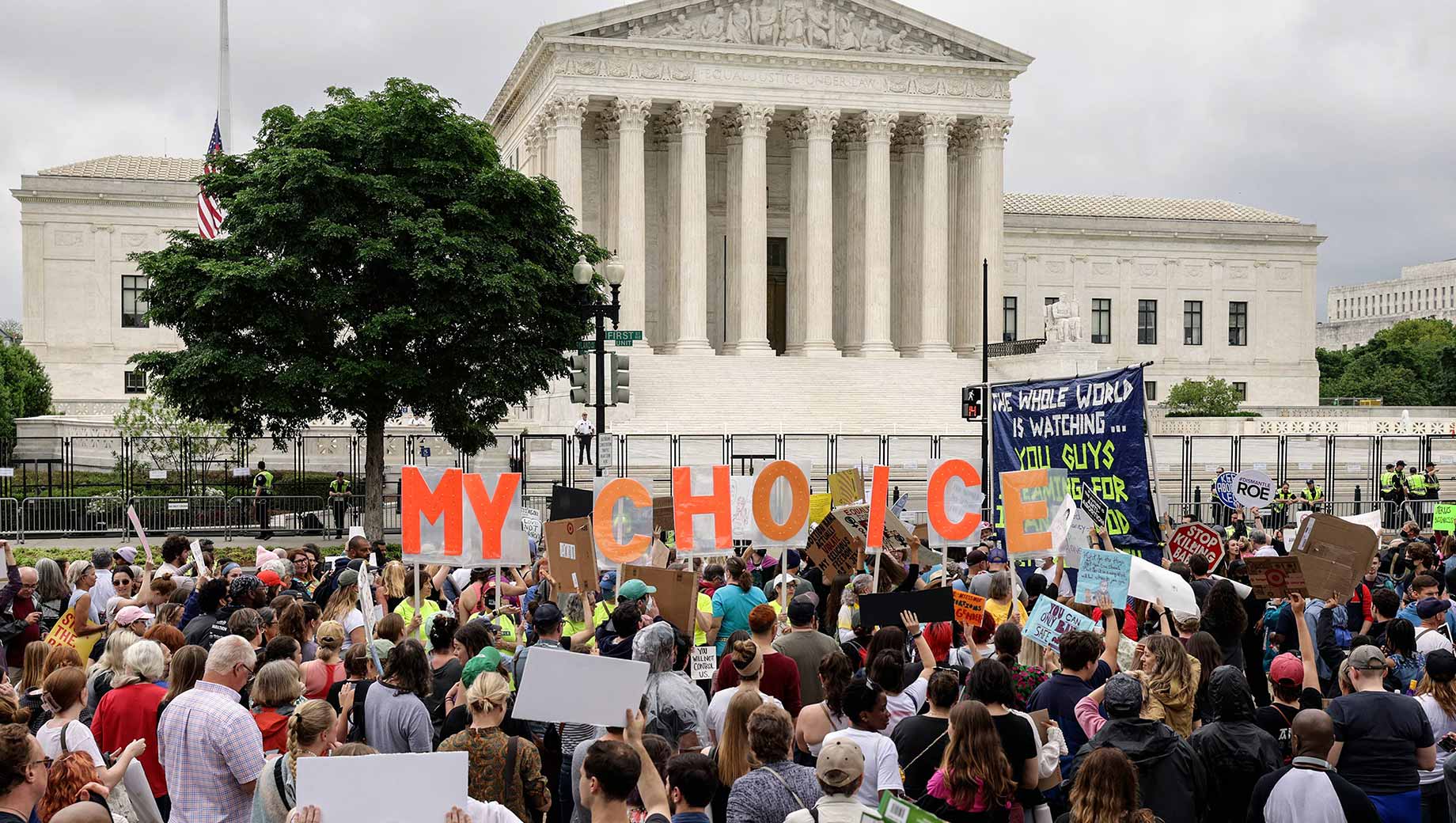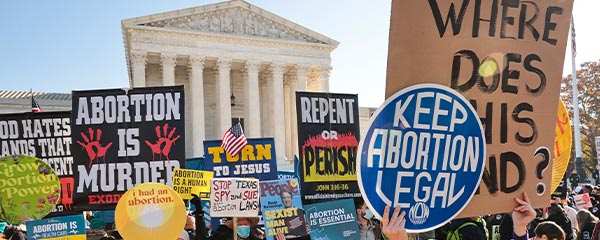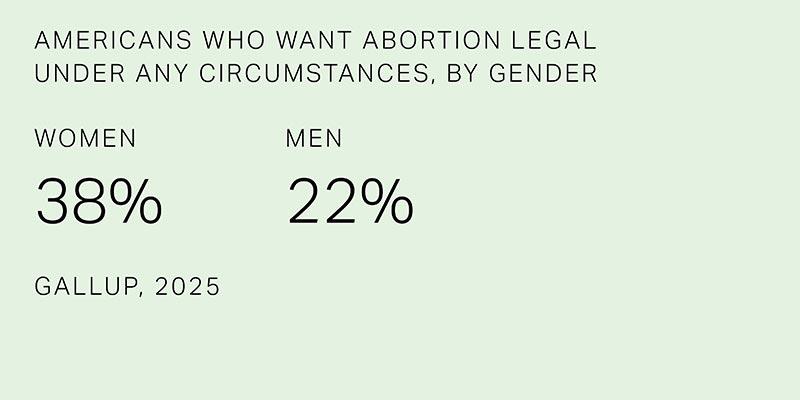Story Highlights
- 55% now identify as pro-choice, the highest percentage since 1995
- For first time, majority of Americans say abortion is morally acceptable
- Democrats drive most of the attitudinal shifts supporting abortion rights
WASHINGTON, D.C. -- A Gallup poll conducted mostly after the draft of a Supreme Court decision addressing abortion rights was leaked finds a marked shift in public attitudes over the past year. After a decade in which Americans' identification as "pro-choice" varied narrowly between 45% and 50%, the percentage has jumped six points to 55% in the latest poll, compared with the prior measure a year ago.
Pro-choice sentiment is now the highest Gallup has measured since 1995 when it was 56% -- the only other time it has been at the current level or higher -- while the 39% identifying as "pro-life" is the lowest since 1996.
Similarly, for the first time in Gallup's trend on the moral acceptability of abortion, originating in 2001, a majority of Americans (52%) consider abortion morally acceptable, while a record-low 38% call it morally wrong.
The latest survey was conducted by telephone May 2-22 with a nationally representative sample of 1,007 U.S. adults. A leaked draft of the Supreme Court's opinion in Dobbs v. Jackson Women's Health Organization was reported by Politico on the evening of May 2, shortly after the start of interviewing for the new poll.
The opinion written by Justice Samuel Alito provides the court's reasoning behind its preliminary decision to uphold a Mississippi law banning abortion after 15 weeks of pregnancy. In this first draft, Alito argues that the 1973 Roe v. Wade decision that affirmed a constitutional right to seek abortion was wrongly decided and must be overturned.
Democrats Rally to 'Pro-Choice' Side as Roe Is Threatened
The increase in pro-choice identification over the past year is mainly driven by Democrats; 88%, up from 70% last year, consider themselves pro-choice.
The poll also shows significant increases in pro-choice identification among Democratic-leaning groups, including younger adults and women. Pro-choice identification increased by nine percentage points to 61% among women, 12 points to 67% among adults aged 18 to 34 and nine points to 58% among adults aged 35 to 54. The percentage "pro-choice" did not change significantly among Republicans, independents, men or older Americans.
Abortion Views Flip From Majority Restrictive to Majority Permissive
Separately, Gallup asks Americans if abortion should be legal under any circumstances, legal only under certain circumstances or illegal in all circumstances. Those who say it should be legal only under certain circumstances are then asked whether they would prefer it to be legal in most or only a few circumstances.
The latest data show Americans are less likely than a year ago to say abortion should be illegal in all circumstances, falling six points to 13%, the lowest Gallup has recorded for this position since 1995. At the same time, the 35% wanting it legal under any circumstances is the highest in Gallup's trend by one point, after increasing slightly each of the past three years.
The combined percentage opting for one of these more supportive positions is now 53%, up from 45% a year ago. Meanwhile, the combined percentage favoring more restrictive policies has fallen from 52% to 45%.
Mirroring the demographic shifts in Americans' preference for the pro-choice label, support for abortion being legal under any or in most circumstances shows the largest increase among Democrats, jumping from 69% to 82%, as well as adults aged 18 to 34, rising from 52% to 63%. It has also increased more among women (up eight points to 59%) than among men (increasing five points to 45%).
Support for abortion being broadly legal increased seven points over the past year among political independents but did not change appreciably among Republicans or adults aged 55 and older.
Most Still Oppose Abortion in Second and Third Trimesters
A defining feature of the 1973 Roe v. Wade decision was its reference to pregnancy trimesters in establishing when states can or cannot limit a woman's right to an abortion. Roe effectively said the state could not limit abortions in the first and second trimesters but had an interest in protecting the fetus after the point of viability, at about the start of the third trimester.
Americans' views have only partially aligned with this distinction over the years, broadly agreeing that abortion should be legal in the first three months of pregnancy and mostly agreeing it should be illegal in the last three months. However, unlike the court's hands-off approach in the second trimester, relatively few Americans have thought it should generally be legal at that stage.
While that general pattern persists in the latest poll, the percentages saying abortion should be legal increased for each trimester, rising seven to eight points for each.
Currently, support for legal abortion in the first trimester runs more than 2-to-1 in favor (67% vs. 27%). A majority of Americans (55%) are generally against abortion in the second three months, while 36% think it should be legal. Americans are most unified in their views on the third trimester, with 71% saying abortion should not be legal at this stage and 20% saying it should be.
Despite Americans' nuanced views about the legality of abortion by trimester, a steady 58% continue to oppose the Supreme Court overturning Roe v. Wade. This likely reflects their concern about states then being able to outlaw abortion altogether, which would prevent women in those states from accessing even first-trimester abortions.
Previous Gallup polling found Americans opposed to laws banning abortions after a fetal heartbeat can be detected (effectively banning abortions halfway through the first trimester), such as those passed in a number of states.
Bottom Line
The prospect of the Supreme Court overturning the case that established women's right to seek an abortion has clearly jolted a segment of Americans into identifying with the pro-choice side of the issue and expressing more unequivocal support for abortion being legal.
The pro-choice and pro-life labels have no official definition but are merely the prevailing terms used by the two major sides of the issue in national discussion and debate. Yet, how Americans interpret the terms can change in response to major events and cues. In the aftermath of the leaked opinion in Dobbs v. Jackson, being pro-life may be more associated than ever with being against Roe v. Wade. This could have pushed some former pro-life identifiers who feel ambivalently about abortion but favor Roe v. Wade to now put themselves in the pro-choice camp. Further, the imminent threat to Roe is causing these same Americans to be less equivocal in their support for abortion rights, with more saying it should be legal in all or most cases, and in all trimesters. And, given that the ruling is coming from the conservative side of the court, most of this reconsideration has occurred among Democrats.
To stay up to date with the latest Gallup News insights and updates, follow us on Twitter.
Learn more about how the Gallup Poll Social Series works.
View complete question responses and trends (PDF download).




